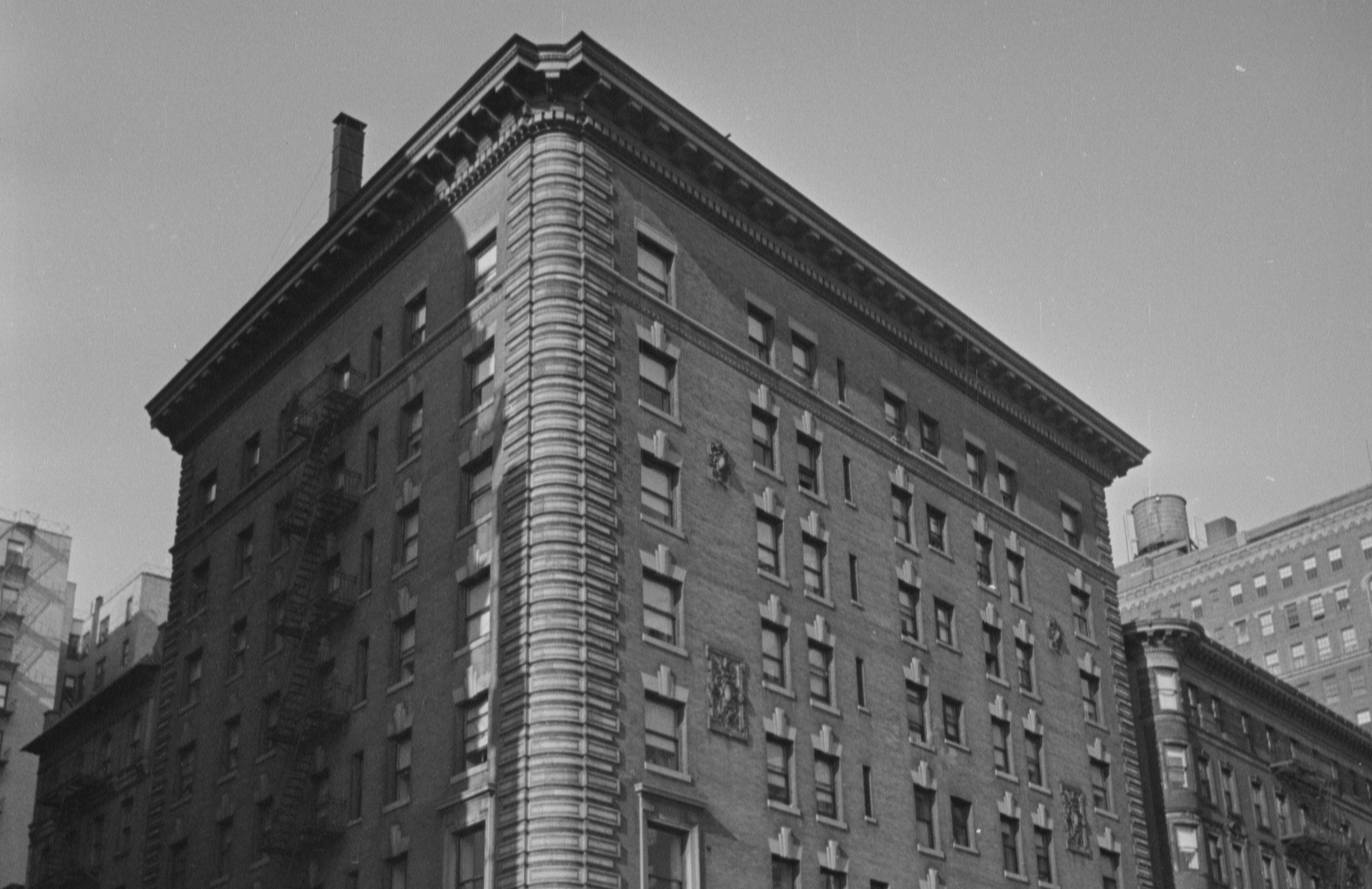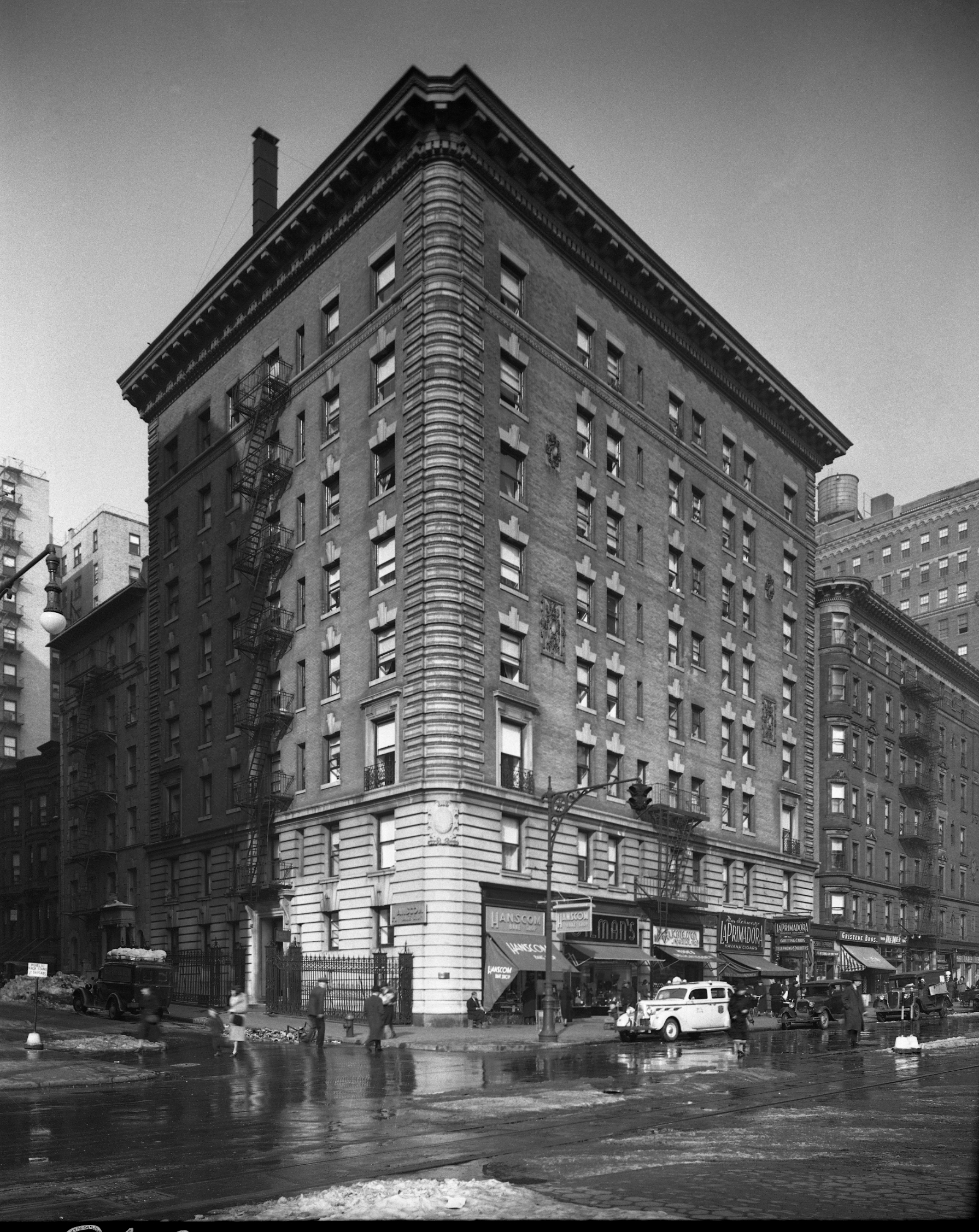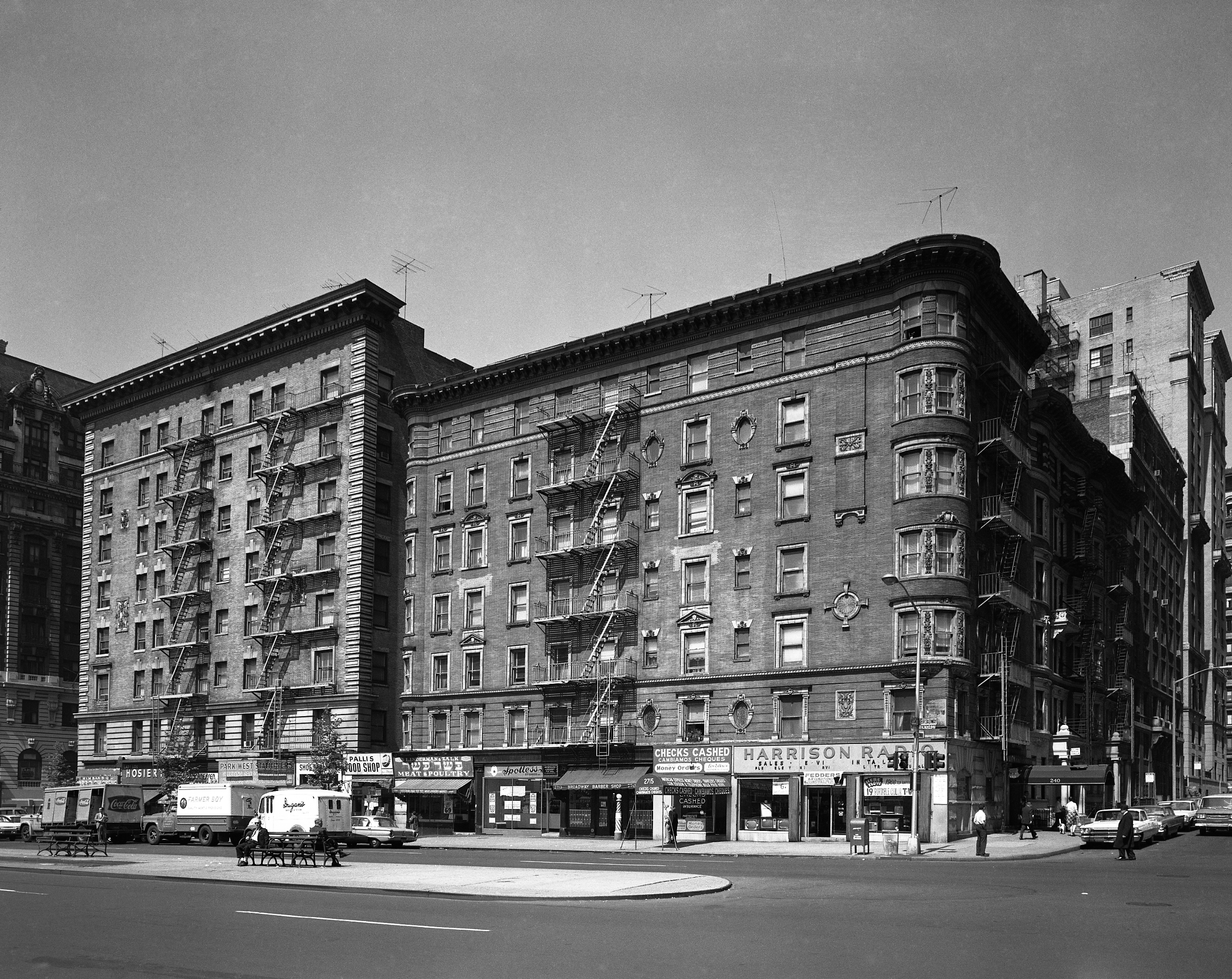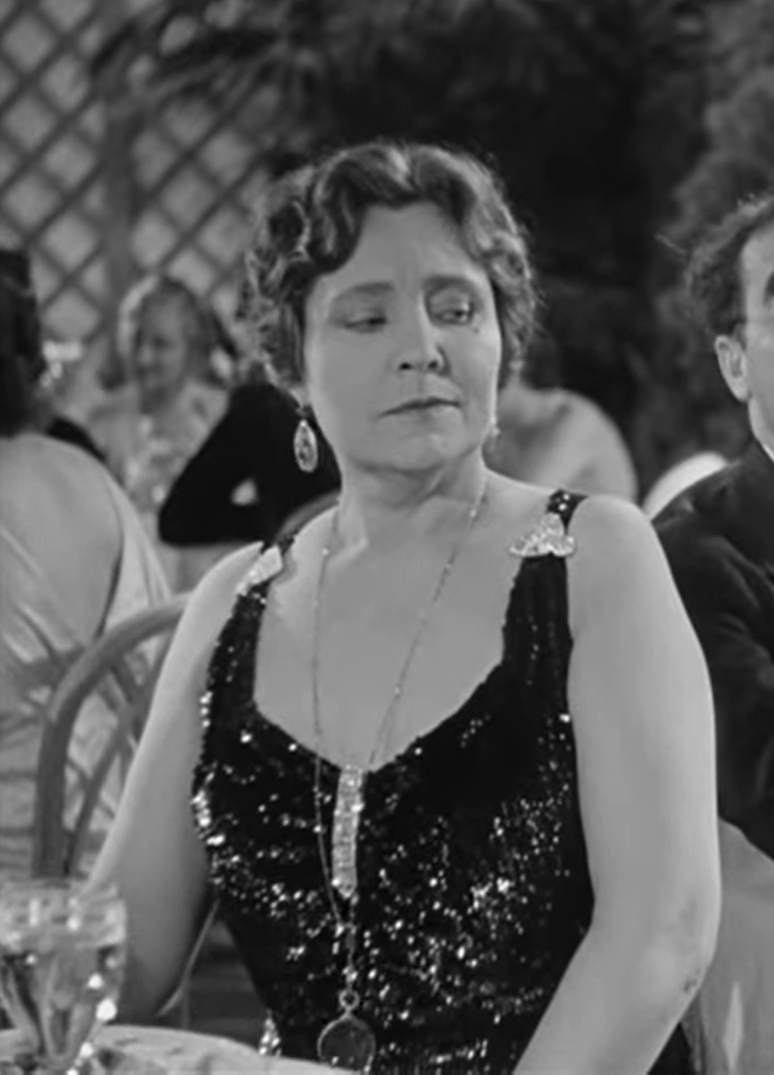
The Friesland
by Tom Miller
In November 1898 architect David W. King filed plans for a seven-story brick “store and flat” at the northwest corner of the Boulevard (soon to be renamed Broadway) and 103rd Street for the Metropolitan Investment Company. King projected the cost of construction at $150,000—a significant $5 million in 2023 money. Completed the following year, the Friesland was clad in sandy-gray brick above a two-story rusticated limestone base. King’s dignified Renaissance Revival design featured a rounded corner with hefty-strap-like quoins, layered keystones, and Renaissance-style decorative panels. The arched residential entrance at 235 West 103rd Street sat above a short stoop, and handsome iron fencing protected the light well along the side street. Stores occupied the ground floor along Broadway.
An advertisement listed rents for the seven or eight-room apartments at between $1,000 and $4,000 per year, or about $3,800 a month for the most expensive by today’s terms.
Among the early residents was Silas F. Catchings, a partner in the brokerage firm O. W. Davis & Co., and a director in the W. A. Cullen Construction Co. He and his wife, the former Nora Waddill, were from the Deep South, Silas having been born in New Orleans. Nora was recording secretary of the New York branch of the United Daughters of the Confederacy. The couple had two children, Waddill, who was president of the Harvard Chess Club in 1901, and Nora Shelby. (Waddill would go on to become a leading banker and financier, and author of influential books on the economy and finance.) Also living with the family in 1901 was one of Silas’s several brothers.
After dinner on Saturday evening, December 28 that year, Silas told the maid to take the coffee back to the kitchen “to be made more palatable,” according to The New York Times. The order did not sit well with the cook, 34-year-old Mary Williams, who felt her coffee was perfectly brewed. She “refused to touch it again,” said the article.
Silas told the maid to take the coffee back to the kitchen “to be made more palatable,” according to The New York Times.
After the maid updated Catchings, he personally went to the kitchen to order the “colored servant girl” to do as she was told. Things did not go well, and he made a hasty retreat. In an article titled “Cook On The Rampage,” The New York Times said, “His brother visited the kitchen and was ejected.”
The maid slipped back into the kitchen to warn Mary that Catchings had called the police. Seeking to make an escape, she squeezed herself into the dumbwaiter, held tightly to the cable, and lowered herself to the floor below. When the police arrived, Mary was nowhere to be found. Then, suddenly, they heard a scream for help. Having reached the opening below, she was unable to let go of the cable and enter that apartment without almost assuredly falling to the basement. The police rushed to that apartment and, “after much hauling finally extracted Mary from the hole in the wall,” said the article.
Catchings had his headstrong cook arrested for disorderly conduct. In court she explained, “Your Honor, the coffee was just like I always made it, and as I wasn’t feeling well I didn’t think it needed making over.” She then accused Silas and his brother of assaulting her. “Then Mr. Catchings came out and nearly pulled the clothes off me, and his brother did the same. I had to jump into the dumbwaiter to save myself from him.” The magistrate did not accept her excuse and fined her $10. Unable to pay the fine, she was locked up.
Like Nora Catchings, other women residents were members of various societies. Another Southerner, Mrs. Emma Martin Maffitt was the historian of the North Carolina Society of The Colonial Dames of America; and Mrs. Fitch James Swinburne was a member of the National Society of New England Women. Mrs. Louis Cheesebrough was treasurer of the Philomath Club, organized in 1911 “for the purpose of promoting the mental and social development of its members.”
Living here by 1903 were real estate developer Harvey M. Hall and his wife. The self-reliant Mrs. Hall proposed to drive herself to visit her mother on November 12 that year. She took the reins of a runabout—a lightweight buggy—and headed north up Seventh Avenue. She stopped for an errand at 125th Street, and while she sat in the carriage a grocery wagon backed up, ripping the front wheel off her vehicle.
The New York Times reported, “Mrs. Hall’s horse started to run. She was thrown to the ground, but clung to the reins and was dragged some twenty or thirty feet before Policeman Rooney succeeded in extricating her.” She had received painful scratches and bruises in the incident. The article noted, “the horse ran on to One Hundred and Twenty-eighth Street, where a tree stopped it.”
Two years later, in October 1905, Mrs. Hall was looking for a new servant. Her advertisement was specific: “Wanted—To do general housework in an apartment, a competent girl; must be a very good cook and laundress, neat, obliging, good wages; references required. Call Friday morning, 11 to 1, car fare paid.”
Emma Maffitt was still living in the Friesland in 1907. A tea she hosted on April 16 that year reflected the elegant entertainments given by some of the residents. The New York Times said, “A Tiffany glass basket of unique design filled with carnations and surrounded with maidenhair ferns formed an attractive centerpiece for the table. There were about 100 guests present.”
Among Emma’s neighbors was Mary Benham Dirthridge, the widow of J. Duncan Dithridge. Her great-grandfather was former New York Governor De Witt Clinton. Active in charitable work, she was secretary of the missionary society of the Fourth Presbyterian Church and a member of the board of the Crippled Children’s Industrial Home.
She changed her stage name to Margaret Dumont and became famous for her supporting comic roles, notably as the wealthy dowager Mrs. Potter in the Marx Brothers films.
A celebrated resident was former actress Daisy Dumont, now married to sugar heir and industrialist John Moller, Jr. Daisy had been trained as an operatic singer and actress as a teen and had performed on the stage in America and in Europe. Prior to her marriage in 1910, she had appeared in The Girls Behind the Counter, The Belle of Brittany, and The Summer Widower. The 1915 census listed the couple living here with a domestic servant, Janoga Kiugo, who was identified as “Japanese, male, alien.”
Following Moller’s death on Christmas Eve, 1918, Daisy went back into acting. She changed her stage name to Margaret Dumont and became famous for her supporting comic roles, notably as the wealthy dowager Mrs. Potter in the Marx Brothers films.
In the meantime, the corner store was home to the Nauheim Pharmacy. In January 1920, during Prohibition, it was one of a few drugstores in Manhattan selected to sell whisky and brandy to patients suffering from the ongoing influenza pandemic. The New-York Tribune noted that the patient would need a prescription from a physician “holding a permit to prescribe whisky.” The article said the store “has been requested by Dr. Copeland to cooperate with the Health Department and assist in the treatment of influenza by handling liquor.”
The Friesland continued to be home to well-to-do tenants through the Great Depression. Then, in 1943, it was converted into a Single-Room-Occupancy hotel. That configuration lasted until 1954 when another renovation resulted in eight apartments per floor.
At some point, the building lost its pressed metal cornice. Otherwise, its outward appearance is relatively unchanged since its opening in 1899.
Tom Miller is a social historian and blogger at daytoninmanhattan.blogspot.com
BUILDING DATABASE
Keep Exploring
Be a part of history!
Think Local First to support the businesses currently at 235 West 103rd Street aka 2701 Broadway:





